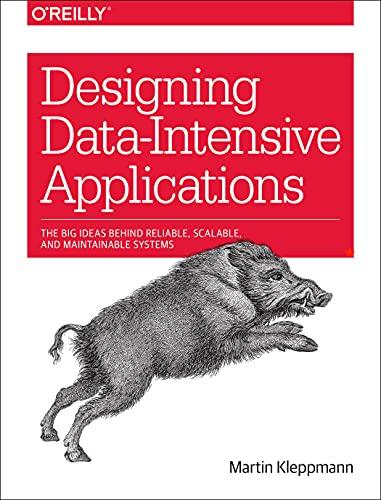Question
Here is the prompt for reference, and to understand my code. I need help with Part 5. Thanks. // HERE IS: julianfuncs.h #ifndef __EE231_julianfuncs_h__ #define
Here is the prompt for reference, and to understand my code. I need help with Part 5. Thanks.
// HERE IS: julianfuncs.h
#ifndef __EE231_julianfuncs_h__
#define __EE231_julianfuncs_h__
void JDNtoYMD(int J, bool julian, int& Y, int& M, int& D);
int GregorianToJDN(int Y, int M, int D);
int JulianToJDN(int Y, int M, int D);
#endif // __EE231_julianfuncs_h__
// HERE IS: julianfuncs.cpp
# include "julianfuncs.h"
int GregorianToJDN(int Y, int M, int D)
{
int jdn;
jdn = (1461 * (Y + 4800 + (M - 14)/12))/4 + (367 *(M - 2 - 12 * ((M - 14)/12)))/12-(3*((Y + 4900 + (M - 14)/12)/100))/4 + D - 32075;
return jdn;
}
int JulianToJDN(int Y,int M, int D)
{
int jdn ;
jdn = 367 * Y - (7 * (Y + 5001 + (M - 9)/7))/4 + (275 * M)/9 + D + 1729777;
return jdn;
}
void JDNtoYMD(int J, bool julian,int &Y, int &M, int &D)
{
int y = 4716, j = 1401, m = 2, n = 12, r = 4, p = 1461, v = 3, u = 5, s = 153, w = 2, B = 274277, C = -38;
int f, e , g , h;
if(julian) f = J + j;
else
{
f = J + j + ( ( ( 4 * J + B ) / 146097 ) * 3 ) / 4 + C;
e = r * f * v;
g = (e % p ) / r;
h = u * g + w;
D = ( ( h % s ) / u ) + 1;
M = ( ( h / s + m ) % n) + 1;
Y = ( e / p ) - y + ( n + m + M ) / n;
}
}
// HERE IS: JulianDate.h
#ifndef __EE231_JulianDate_h__
#define __EE231_JulianDate_h__
#include
class GregorianDate;
class JulianDate
{
private:
int _jdn;
public:
JulianDate();
JulianDate(int JDN);
JulianDate(int year, int month, int day);
JulianDate(const GregorianDate& g);
void set(int JDN);
void set(int Y, int M, int D);
int getJDN() const;
int getYear() const;
int getMonth() const;
int getDay() const;
};
// write data to stream
inline std::ostream& operator
{
return os
}
// number of days between two dates
inline int operator-(const JulianDate& a, const JulianDate& b)
{
int diff = b.getJDN() - a.getJDN();
if( diff
return diff;
}
// date n days after date d
inline JulianDate operator+(const JulianDate& d, int n)
{
JulianDate newJulianDate( d.getJDN() + n );
return newJulianDate;
}
#endif // __EE231_JulianDate_h__
// HERE IS: JulianDate.cpp
# include "julianDate.h"
# include "gregorianDate.h"
JulianDate::JulianDate()
{
_jdn=0;
}
JulianDate::JulianDate(int JDN)
{
_jdn = JDN;
}
JulianDate::JulianDate( int year, int month, int day )
{
_jdn = JulianToJDN( year, month, day);
}
JulianDate::JulianDate(const GregorianDate &g)
{
_jdn = GregorianToJDN( g.getYear(), g.getMonth(), g.getDay() );
}
void JulianDate::set(int JDN)
{
_jdn = JDN;
}
void JulianDate::set( int Y, int M, int D )
{
_jdn = JulianToJDN( Y, M, D );
}
int JulianDate:: getJDN() const
{
return _jdn;
}
int JulianDate::getYear() const
{
int day, month, year;
JDNtoYMD( _jdn, true, year, month, day );
return year;
}
int JulianDate::getMonth() const
{
int day,month,year;
JDNtoYMD( _jdn, true, year, month, day);
return month;
}
int JulianDate::getDay() const
{
int day, month, year;
JDNtoYMD( _jdn, false, year, month, day );
return day;
}
// HERE IS: GregorianDate.h
#ifndef __EE231_GregorianDate_h__
#define __EE231_GregorianDate_h__
#include
class JulianDate;
/* Description:
*
*
*/
class GregorianDate
{
private:
int _year, _month, _day;
public:
GregorianDate();
GregorianDate(int JDN);
GregorianDate(int year, int month, int day);
GregorianDate(const JulianDate& j);
void set(int JDN);
void set(int Y, int M, int D);
int getJDN() const;
int getYear() const;
int getMonth() const;
int getDay() const;
};
// write data to stream
inline std::ostream& operator
{
os
return os;
}
// number of days between two dates
inline int operator-(const GregorianDate& a, const GregorianDate& b)
{
int jdn1 = GregorianToJDN(a.getYear(),a.getMonth(),a.getDay());
int jdn2 = GregorianToJDN(b.getYear(),b.getMonth(),b.getDay());
int diff = jdn2 - jdn1;
if( diff
return diff;
}
// date n days after date d
inline GregorianDate operator+(const GregorianDate& d, int n)
{
GregorianDate newDate(d.getJDN()+n);
return newDate;
}
#endif // __EE231_GregorianDate_h__
// HERE IS: GregorianDate.cpp
# include "gregorianDate.h"
# include "julianDate.h"
GregorianDate::GregorianDate()
{
_year = 0;
_month=0;
_day=0;
}
GregorianDate::GregorianDate(int year,int month,int day)
{
_year = year;
_month = month;
_day = day;
}
GregorianDate::GregorianDate(int JDN)
{
JDNtoYMD(JDN,false,_year,_month,_day);
}
GregorianDate::GregorianDate(const JulianDate &j)
{
JDNtoYMD(j.getJDN(),false,_year,_month,_day);
}
void GregorianDate::set(int JDN)
{
JDNtoYMD(JDN,false,_year,_month,_day);
}
void GregorianDate::set(int Y, int M, int D)
{
_year = Y;
_month = M;
_day = D;
}
int GregorianDate::getJDN() const
{
return GregorianToJDN(_year,_month,_day);
}
int GregorianDate:: getYear() const
{
return _year;
}
int GregorianDate::getMonth() const
{
return _month;
}
int GregorianDate::getDay() const
{
return _day;
}
// HERE IS: test-jdate.cpp
#include
#include "JulianDate.h"
#include "GregorianDate.h"
template
void testDate(T& today, T& td)
{
int diff = today-td;
std::cout
std::cout
std::cout
std::cout
std::cout
}
// returns current Julian Day Number
double NowAsJDN()
{
time_t t = time(0);
return (t / 86400.0) + 2440587.5;
}
int
main()
{
std::cout
std::cout
std::cout
// If doing the extra credit part,
// add to and modify this section to test the classes
// GregorianDate2 and JulianDate2
// BEGIN
JulianDate jtoday(NowAsJDN()), jtd(1970,8,1);
std::cout
testDate(jtoday, jtd);
std::cout
GregorianDate gtoday(NowAsJDN()), gtd(1970,8,1);
std::cout
testDate(gtoday, gtd);
std::cout
// END
return 0;
}
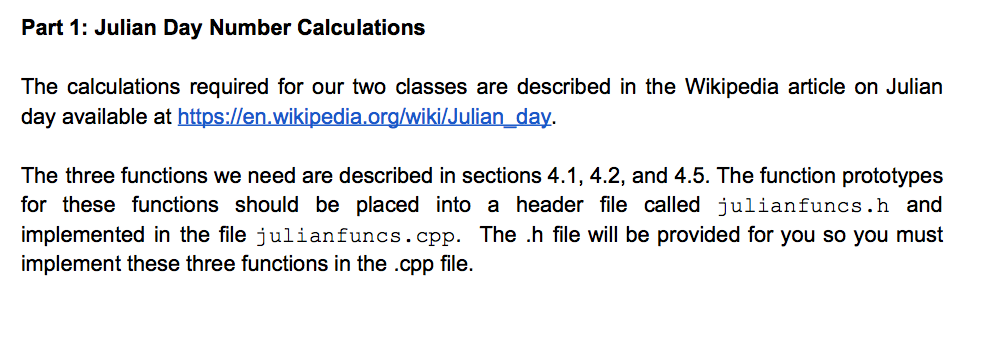
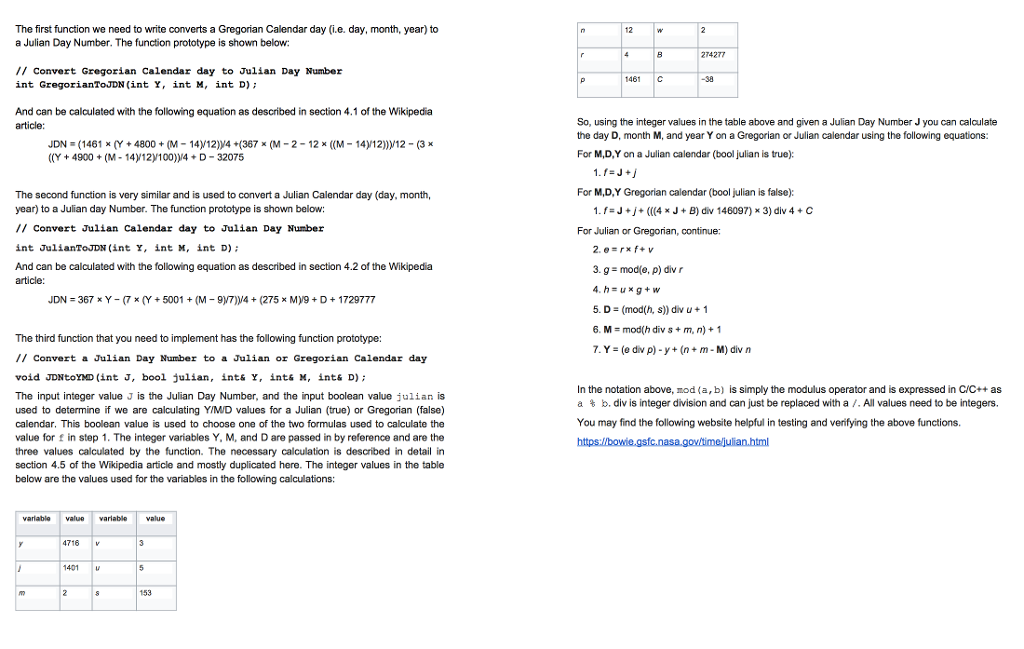
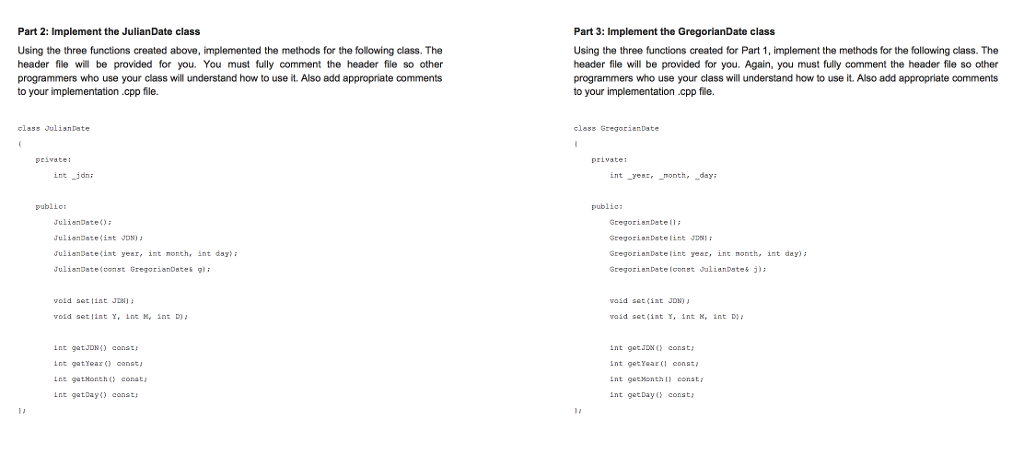
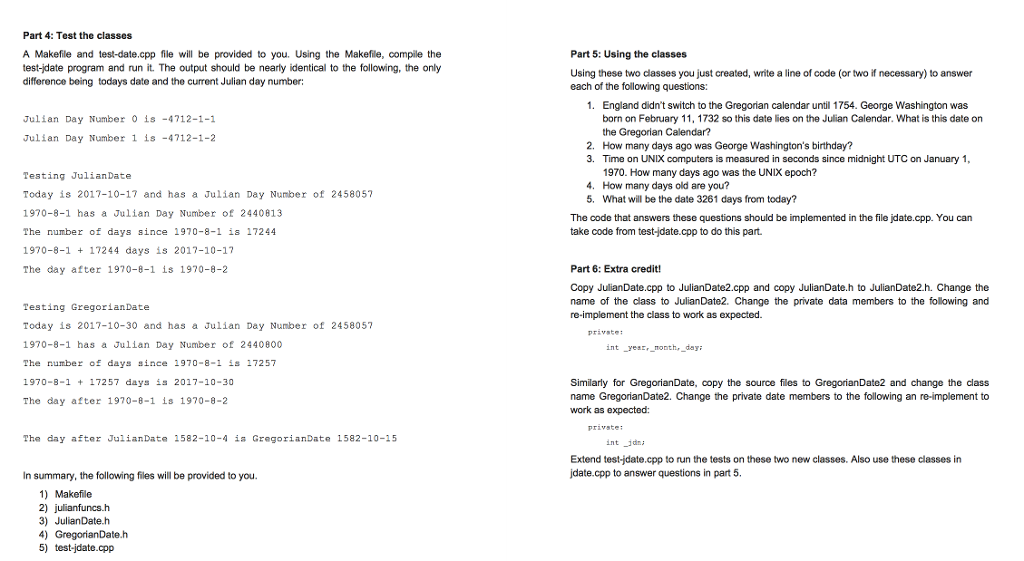
Step by Step Solution
There are 3 Steps involved in it
Step: 1

Get Instant Access to Expert-Tailored Solutions
See step-by-step solutions with expert insights and AI powered tools for academic success
Step: 2

Step: 3

Ace Your Homework with AI
Get the answers you need in no time with our AI-driven, step-by-step assistance
Get Started


